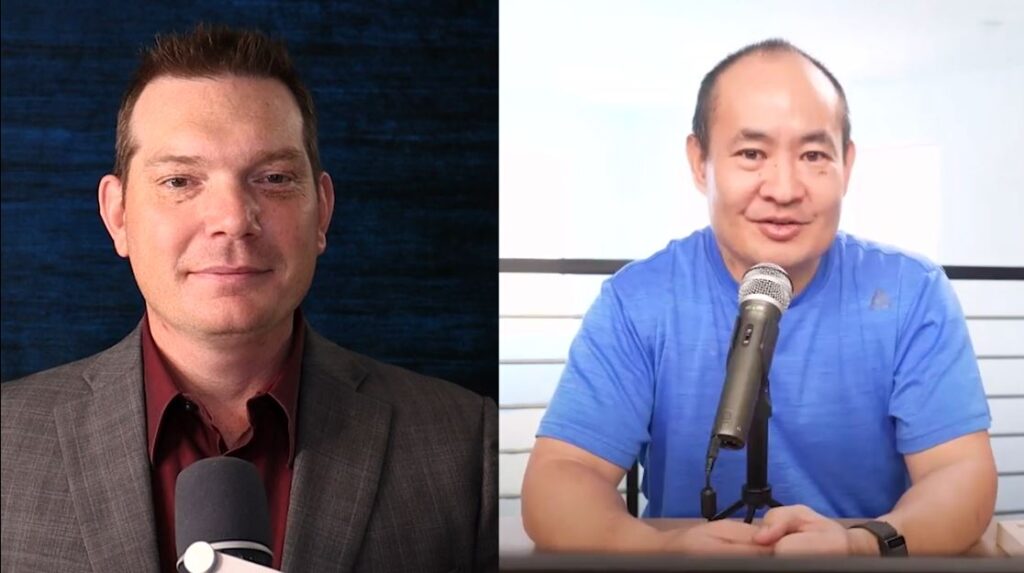Most people believe that once they make enough money, life will finally feel secure, happy, and fulfilling.
But what if that’s not the case?
In a powerful episode of the Innovate & Overcome podcast, Mike Brown (Founder at Unbreakable Wealth) joins me to share the untold story behind his business success, the toll it took afterwards, and what it means to understand wealth beyond money.
When Success Isn’t What You Expected
What happens after checking all the boxes of the American Dream? Mike Brown sold his eight-figure oil and gas firm and expected lasting satisfaction.
Instead, he felt completely drained and disoriented. He was losing over $100,000 a month from a struggling business he acquired.
Mike explains: Making money is not the same as being wealthy. “I made money,” he said, “but I didn’t acquire the mindset and the habits to be a good steward of that wealth.” Without direction, wealth can slip away quickly.
His story highlights how unclear goals and emotional stress can follow even the biggest wins.
The Difference Between Accumulators and Defenders
Mike sees two financial roles: builders and protectors. Most entrepreneurs excel at building—they hustle and take bold risks. These are the accumulators.
But to maintain wealth, a shift needs to happen.
“We need to go from being an accumulator of wealth to being a defender of wealth,” Mike explains. Being a defender means having the right habits, systems, and mindset to protect your wealth and grow it wisely.
After selling his company, Mike acquired a failing business because he thought more success would make him feel qualified to coach others. “I didn’t feel worthy of coaching others,” he shared. That decision led to a loss but also brought perspective.
The Cost of Not Knowing Who You Are Without Your Work
Success left Mike questioning his identity. “I thought I’d never be unhappy again,” he said, “but I had no idea who I was without my company.”
He filled that void with activity, chasing another big project that eventually failed. But the lesson was deeper: he wasn’t trying to grow another business, but avoiding his own feelings of unworthiness. That realization changed everything.
“I was drawn to constant crisis,” Mike admitted. “It felt more comfortable to be in the middle of a problem than to be still and ask myself what I really wanted.”
A Different Way to Think About Retirement
This idea of rethinking retirement isn’t new to me. In fact, I had a similar conversation with Kim Butler, who shared her perspective on turning the traditional idea of retirement into a lifelong mission of purpose and contribution.
Kim’s approach mirrors Mike’s—focusing on living fully, staying active, and serving others well into later life. Her story of resilience, especially after losing her life insurance license, is a powerful reminder that the end of one chapter can be the start of something even more meaningful.

Instead of aiming for a finish line called “retirement,” Mike suggests thinking about ongoing engagement. Not because you have to, but because it aligns with your values.
He uses the term “escape velocity”—having enough passive income from assets to support your lifestyle without drawing down the principal. This isn’t about never working again. It’s about having the freedom to choose meaningful work.
What Real Wealth Actually Means
Mike defines wealth through four freedoms:
- Freedom of Health – Being well enough to enjoy life.
- Freedom of Relationships – Choosing who you spend time with.
- Freedom of Time – Managing your own schedule.
- Freedom of Mind – Going to bed without financial worry.
Money plays a role, but it should serve your values, not the other way around. When you live by what matters to you, money supports, not drives, your choices.
Hard Truths for the Next Generation
Machines and software are changing jobs quickly. Mike says the definition of work is shifting, and that shift will bring both freedom and confusion.
My friend Dennis Yu often says something similar, especially when it comes to using AI wisely. “The key to thriving with AI is to focus on what AI cannot do—and that starts with relationships,” he says.

Machines might handle tasks, but they can’t have coffee with someone or build lasting trust. Whether it’s meeting in person, working with family, or helping clients directly, human relationships remain essential.
“We’ve tied our worth to our work,” Mike says. “And that’s going to break a lot of people.”
Mike sees value in building connection and contribution—things machines can’t replicate. Sharing your story, being helpful, and developing community still matter.
How to Prepare for the Future
Mike Brown keeps it practical. He says the best way to move forward is by focusing on what’s within your control:
- Get clear on your values.
- Use income to build useful assets.
- Learn skills that solve problems.
- Spend time on your health and with people who matter.
He adds, “You can only cut so much,” but “your income has no cap.”
The fastest way to improve your financial future is by growing your income and making useful investments. That could mean running a smarter business, learning new tools, or finding ways to help others that AI can’t touch.
Key Takeaways From Mike Brown’s Story
- Making money is not the same as building lasting wealth.
- True wealth comes from freedom in health, relationships, time, and peace of mind.
- Entrepreneurs often struggle with identity after success—don’t ignore the emotional side of wealth.
- Think of retirement as purpose-driven work, not an endpoint.
- Escape velocity means your assets support your lifestyle without relying on constant work.
- Adapt by growing your income and investing in what you value most.
Want to discover how to take control of your financial future? Check out “Becoming Your Own Banker“.